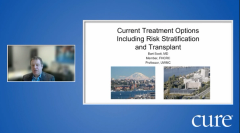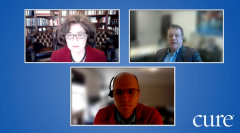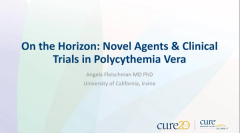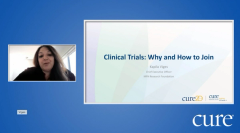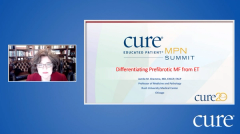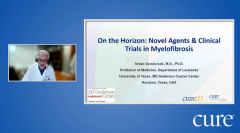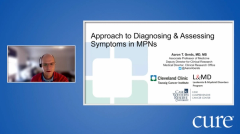
Educated Patient® MPN Summit Clinical Trials Presentation: May 7, 2022
Watch Kapila Viges, from the MPN Research Foundation, discuss clinical trials, during the CURE Educated Patient MPN Summit.
Episodes in this series

Understanding the various aspects of clinical trials can be overwhelming, and many patients with myeloproliferative neoplasms (MPNs) may be hesitant to join because of common misconceptions. However, one expert explained that it is important for patients to join clinical trials as it may help them in their treatment journey, as well as advance their community.
Kapila Viges, chief executive officer of the MPN Research Foundation, explained that this is an exciting time for patients with MPNs to join clinical trials because there are so many of them available; however, it can be hard to navigate.
“I think it’s really important for MPN patients to know right now is an exciting and inspiring time in clinical trials because there are so many … that are recruiting right now. So, on one hand its very inspiring to know that many treatments are potentially on the horizon,” she said in an interview with CURE®. “At the same time there are so many that it can be a little daunting to navigate and sort through what trials are right for which patient.”
Viges discussed the importance of clinical trials for patients with MPNs, and how to navigate and understand them further at CURE®’s Educated Patient® MPN Summit.
Understanding Clinical Trials
Clinical trials can be hard for some patients to understand, Viges noted, as there is a lot of language around it which can be tough to navigate. She explained a clinical trial goes through four phases:
- Phase 1: This phase is to evaluate the safety of a therapy, determine a dosage and identify side effects.
- Phase 2: This phase tests the effectiveness and further evaluates the safety of a therapy.
- Phase 3: This is to confirm the effectiveness, monitor side effects and compare a therapy with the best available options for that patient population.
After those three phases are completed, and before the fourth stage begins, it is reviewed by regulatory authorities and the Food and Drug Administration (FDA) to further evaluate for safety and effectiveness prior to approval.
And during the fourth phase, the sponsors of those drugs and further clinical trials continue to evaluate the therapy in real-world situations. This will then bring even broader information to the public about the drug once it is available, Viges explained.
Why Join a Clinical Trial
Viges added that clinical trials are not just beneficial for the pharmaceutical companies and researchers, but they can be for patients as well for a few different reasons.
“The benefit of it is it really gives (a patient) access to newer, leading therapy ahead of its approval,” she said.
An additional benefit, Viges explained, is that the sponsor of the drug or treatment typically supports the infrastructure and cost of the trial.
There is also the benefit of “doing something for the greater good,” she said. When a patient joins a clinical trial, they become a part of advancing overall research for their community. She hears a lot of patients say that they feel empowered to be a part of a clinical trial that can advance their community forward and bring forth a possible solution to the disease.
“Going through that clinical trial process, not only are patients getting access to potential treatment for their own (disease), but they’re advancing the research paradigm for the entire patient population. And making (new therapies), hopefully in a positive way, available to the broader patient population if ultimately, they’re successful and approved by regulatory authorities,” she explained.
How to Join a Clinical Trial
As Viges previously mentioned, for a patient with an MPN, joining a clinical trial can be overwhelming because there are so many to choose from. But they can start with visiting the “gatekeeper” of all these trials on clinicaltrials.gov, a website that tracks and monitors all the registered clinical trials.
Patients can search their disease type on this site and find all the clinical trials that are relevant to them. And then bring what they find to their physician to help decide what might be a good match for them.
“There are many, and the language can be quite difficult to navigate. But some very empowered and well-intended patients who educate themselves on all of these terms are able to navigate it,” she added.
There are also some other tools available to help “matchmake” a patient to a clinical trial. She explained that the MPN Research Foundation has a list on their website which breaks the trials down by eligibility, so it is more accessible and easier to understand for patients.
Additionally, they are currently working on a tool that will allow patients to enter more of their personal information to get an even more specific match to a trial — however, even if a patient is a perfect match for a clinical trial it is important they talk to their physician about it first.
“All of this really should go through their own physician and (patients should be) having an open and honest dialogue because their physician can really help them understand, navigate and figure out what’s best for them,” she said.
Debunking Skepticism
Viges mentioned that patients may be hesitant to join a clinical trial due to skepticism or common misconceptions. One of those is the idea that if a patient isn’t receiving the new therapy that is being tested, they are just given a placebo or fake therapy; however, that is not true.
“Although it may happen in some cases, for the most part, patients are getting either the new therapy or what the best available therapy is,” she said. “So regardless, there is a benefit to participating. It’s not just a waste of time and (a patient would) not (be) getting something that wouldn’t be right for them.”
Other patients may feel skeptical about the pharmaceutical companies’ and sponsors’ motives when testing a new therapy. However, Viges assured they have the patient’s best interest in mind.
“We all benefit from safe and effective therapies, including pharmaceutical companies. And so, while there may have been isolated incidents where things did not go well and there were potentially some negative impacts or negative motives, for the most part the pharmaceutical companies, the regulatory authorities and the clinicians really have the best interest of the patients at heart and are trying to bring forward the safest and most effective therapies because that is a win for everybody,” she explained.
This is also the case when it comes to the concept of consent for patients when they enter a trial. Viges said that many patients feel that they are singing away their privacy or their rights because there is so much language it is hard to understand what they are signing up for, however those consent forms are there to protect their privacy.
“Perhaps there is a misconception about participating in a trial in terms of what all that paperwork and language entails. But the regulators and the folks who are monitoring these efforts and trials are looking out for the patients’ best interest,” she concluded.
For more news on cancer updates, research and education, don’t forget to

